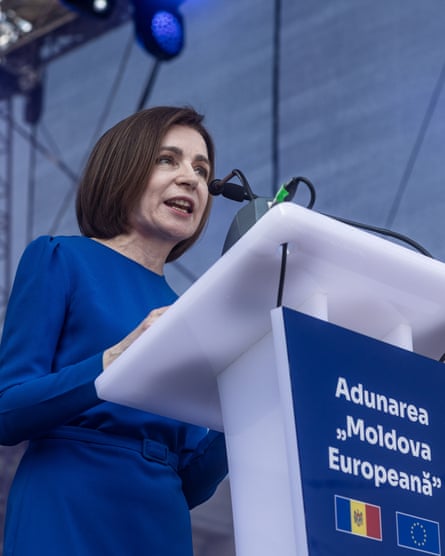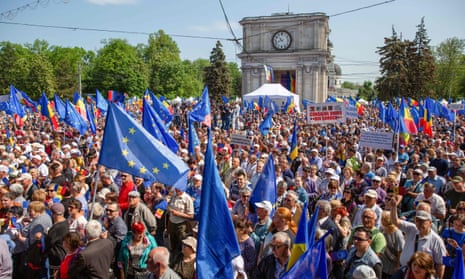Britain needs all the friends it can get as it fights to be heard in a European sphere from which it recklessly exiled itself three years ago. This increasingly desperate post-Brexit quest for relevance and influence will take Rishi Sunak to Moldova this week, a poor, landlocked former Soviet republic of fewer than 3 million people, squeezed between Ukraine and Romania, that many in the UK might struggle to locate without help from Google Maps.
Sunak will attend the second annual summit of the European Political Community, to which 46 other national leaders are invited. Ironically, the EPC is the brainchild of France’s president and Tory Brexit bogeyman, Emmanuel Macron. It brings together EU states plus countries, such as Turkey and Serbia, denied EU membership, and outliers, such as the UK and Norway, that don’t want it.
The summit will seek to develop common positions on security, climate and energy. But for Moldova and its president, Maia Sandu, the supportive presence of so many senior foreign leaders in the capital, Chișinău, is a moment of great national hope. It puts Moldova, formerly Bessarabia, on the map at a critical juncture. It’s symbolically important for Britain and the west, too. The reason can been summed up in one word: Russia.

If Vladimir Putin had succeeded in overrunning Ukraine last year, it is widely believed that his troops would have swept through Transnistria, a separatist border region of Moldova controlled by pro-Russia forces, and seized the remainder of the country. In February, a plot to topple Sandu’s government was uncovered. Moscow issued the usual denials.
There’s no doubt Moldova remains a Russian target.
That’s mainly because, like Ukrainians, many in Moldova see their future in the west, inside the EU. Sandu has also hinted that its traditional neutrality could be jettisoned in favour of joining a “larger alliance” – meaning Nato, with which it already cooperates. These aspirations pre-date the Ukraine invasion. Putin’s aggressive behaviour has greatly accelerated the westwards shift.
The EU granted Moldova candidate status last June, allocating millions of euros in loans, and helping reduce reliance on Russian gas. But it has yet to set a date for accession negotiations. Last Sunday, 75,000 people joined Sandu at a rally in Chișinău calling for full EU membership. “We came to say loudly, confidently and proudly that Moldovans are Europeans!” she said.
Such unbridled enthusiasm for Europe may be hard for Sunak to get his head around – but he should pay attention. The rally recalled the 2013 Euromaidan demonstrations in Kyiv, when Ukrainians chose the EU over Moscow. That democratic rejection led directly to Russia’s first invasion the following year. Putin complained then of supposed Nato threats and western encroachment in Russia’s old “near abroad”. Now he does so again, in Moldova.
Sandu faces an unscrupulous, Kremlin-backed opposition and vocal pro-Russia minority. She warned that her country is vulnerable to continued Russian destabilisation, sabotage, disinformation and influence operations. At the rally beside her, Roberta Metsola, European parliament president, pledged that the EU would welcome Moldova “with open arms and open hearts”.
That is a promise that must be kept, and soon. Moldova is on the frontline of the west’s confrontation with Russia. It has been hit by missiles and threatened with regime change. Putin must not be allowed to spread his poison there. If Sunak wants to be useful, he should demonstrate Britain’s support for this vital piece of European integration with an offer of security assistance and aid. Who knows? He might win back some friends.
